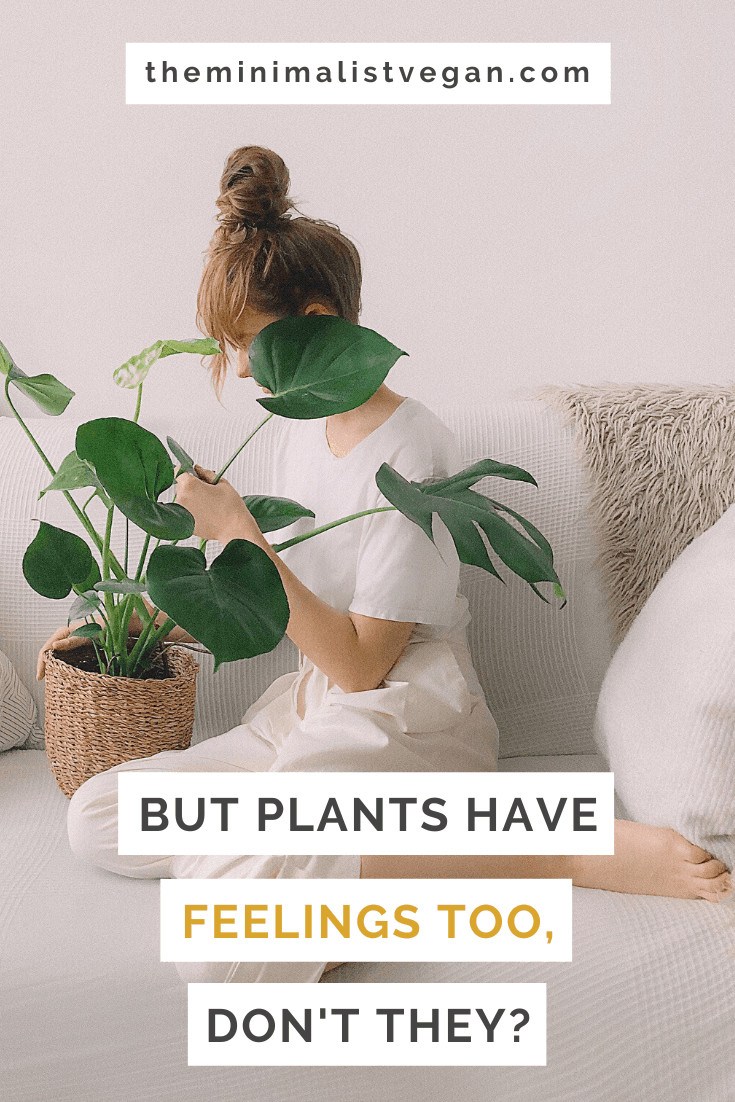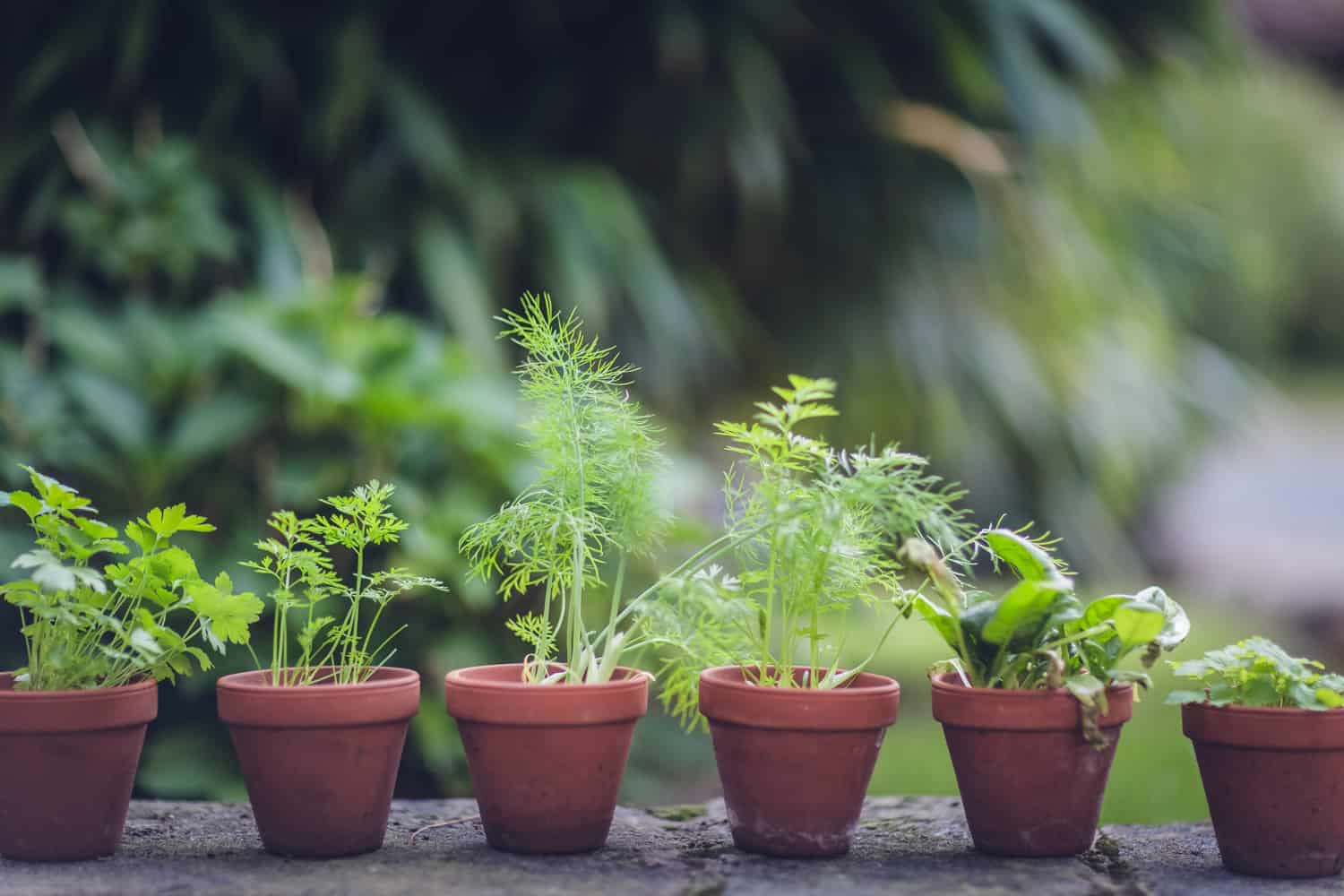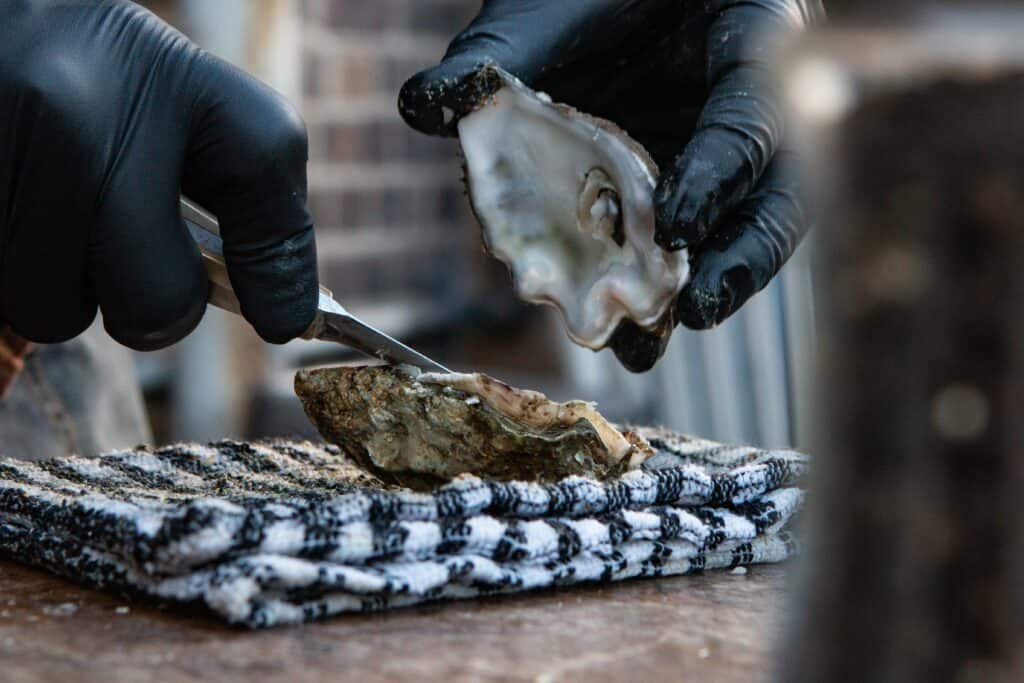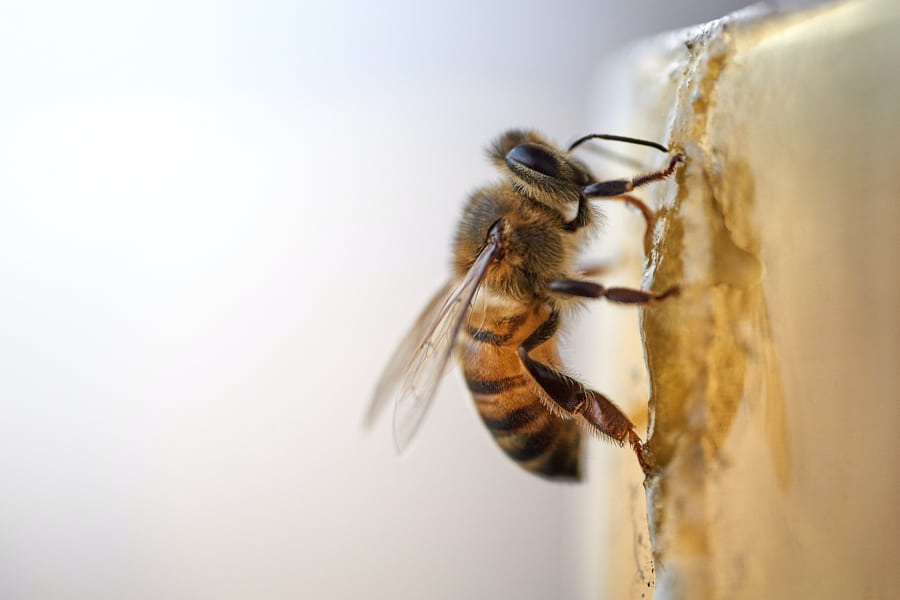Do plants feel pain? Do plants have feelings?
As you process these questions, you probably have a natural assumption that plants do or do not feel pain.
Whatever your stance, it may seem pretty straightforward. As it turns out, the answer to this question can be complex.
If you’re vegan, you probably cringe every time someone tells you, “but, plants have feelings too”. Or ask, “if you care about killing animals, why don’t you care about killing plants?”
Then you non-confidently mumble back a response about how plants don’t have a central nervous system so scientifically, they can’t feel pain.
While this statement is somewhat true, there’s more to consider about the sentience of plants.
I get the intent behind the questions. If plants have feelings and can experience pain, then what’s the difference between eating animals and plants? Why is there a hierarchy of suffering?
This post is my attempt to present arguments for and against the “plants have feelings too” debate, before weighing in on my own opinion towards the end.
Let’s get into it.
What’s pain, and how does it work?
To understand if plants feel pain, we must first define what pain is.
A quick Google search reveals that pain is a highly unpleasant physical sensation caused by illness or injury.
Okay, that seems pretty obvious. Let’s get a little more specific.
Animals (human and non-human) perceive pain through sensory nerve cells. The same network of cells that process our sight, touch, smell, hearing and taste.
As explained in the textbook Pain and Disability: Clinical, Behavioral, and Public Policy Perspectives, pain receptors which are present in most body tissues, respond to damaging or potentially damaging stimuli.
Messages initiated by this stimuli are transmitted by nerve cells to the spinal cord and the brain (your central nervous system). If the brain perceives the threat to be legitimate, it responds by creating a sensation of pain to direct attention to the body part so that the danger can be mitigated.
It’s as if you were to hit your big toe on the bottom of your bed frame. The impact of the connection creates stimuli. From there the nerve cells get sent to your brain, which the brain approves and creates the sensation of pain to your big toe.
With this information, you analyse the risk of further pain by avoiding repeated action. Additionally, your brain signals to not to put pressure on your toe to give it time to heal.
We must also remember that pain is a subjective emotion, not just a physical response. This is why animals can experience complex pain-related emotions like fear, sadness and anger.
For example, a cow can experience trauma from being separated from her calf after birth, much like how a human mother could experience the same emotional pain in the same situation.
To summarise, pain is the process of turning stimuli into a subjective emotional experience to mitigate future risk and promote healing.
What’s a plant?
Plants are living organisms that come in many different forms. We’ve come to know them as trees, shrubs, herbs, grasses, ferns, and mosses.

There are three basic structures of a plant:
- Leaf – the leaf is an organ of a plant that captures energy from sunlight. Leaves also collect carbon dioxide from the air.
- Stem – the stem is the core structure of a plant that supports leaves, branches and flowers. Stems have vascular tissues that move food and water around the plant to help it thrive and grow. Plants often store food in stems.
- Roots – the roots of a plant grow underground and help the plant stay balanced while also gathering minerals and water from the soil. Some plants store food in their roots.
There are almost 400,000 plant species, and scientists are discovering more each day.
To put it simply, plants rule the world – representing 80 per cent of the earth’s biomass.
Personally, I love plants as we owe our existence to them.
They provide food, shelter, shade, clean air and beauty. Plants, in many ways, represent life.
It’s essential to acknowledge the overwhelming significance of plants as we consider the emotions of this infinitely generous species.
A case for why plants feel pain and have emotion
In this next section, I break down three case studies that are regularly referenced when making an argument that plants feel pain.
Where possible, I’ve linked the papers for your perusal.
1. Plants can hear themselves being eaten by caterpillars
In a paper published in 2014 titled Plants respond to leaf vibrations caused by insect herbivore chewing, researchers found plants increased their chemical response to the vibrations caused by a caterpillar chewing.
The study involved placing caterpillars on plants called Arabidopsis, then using lasers and reflective materials to measure the movement of the leaf in response to the caterpillar munching.
The recordings of the caterpillars feeding vibrations were played back to a set of plants and played silence to another set of plants.
It was found that plants that had been forced to listen to the sound of vibrations from munching produced more mustard oils, which are chemicals insects don’t like.
The argument here is that plants respond to pain by producing defence mechanisms when they detect a threat.
2. Plants can communicate with each other
In a paper published in 1983 titled Rapid Changes in Tree Leaf Chemistry Induced by Damage: Evidence for Communication Between Plants, researchers found signs of communication amongst maple trees as a response to intentionally cutting their leaves.
Specifically, increased rates of synthesis and phenolic compounds were found amongst a group of maple seedlings 52 hours after having 7 per cent of their leaf area removed from tearing.

The argument here is that plants can release chemicals as a form of communication to warn other plants of the threat, as a reaction to pain.
This paper was met with a lot of controversies as early studies could not be replicated.
Then another paper published in 2014 titled Volatile communication between plants that affects herbivory: a meta-analysis, stating that they found 48 well-replicated studies since 1983 research. Through their meta-analysis, they found overall support for the hypothesis that resistance increased for individuals with damaged neighbours.
But like most research, they stated in the conclusion that more testing is required for consistency of results, and adjusted for environmental variables. For example, all of the studies reviewed so far occurred in a lab, not in nature, which may be a factor when analysing the communication between plants.
The other question mark in the testing is the lack of reciprocation in communication between the plant subjects. It appears that when herbivores attack a plant, the plant emits communications to others, but there’s no evidence of the other plants communicating to the emitter.
This suggests that the response of the emitter is more of a message or broadcast of warning, as opposed to a cry for help.
3. Plants are reportedly “screaming” when under stress
In a paper published in December 2019 titled Plants emit informative airborne sounds under stress, researchers found that plants emit high-pitched sounds when threatened.
Specifically, they recorded sound waves over some time for tomato and tobacco plants when dry, cut, and normal.
The results showed that when the plant was under stress, e.g. dry or cut, they found the plants began to emit ultrasonic sounds between 20 and 100 kilohertz.
Plants emit sounds that humans can’t hear (without assistance), so the researchers used ultrasonic microphones to detect the sound waves in the study.
Keep in mind that this paper is not peer-reviewed at the time of publishing this post.
But the results do raise an interesting element to the “plants have feelings” debate.
If plants are, in fact, screaming when under stress, we can make some assumptions that they do at least react to pain.
A case for why plants don’t feel pain and have emotions
Whether it’s reacting to vibrations, sending warning signals, or literally screaming, we still have much to learn about plants.
These examples together are put forward as a compelling case for plants being able to experience pain.
Having said that, the argument for why plants don’t feel pain or emotions doesn’t need much explaining. It all comes down to biology.
As explained earlier in this post, pain is an experience that incorporates communication between stimuli, receptors, cells, and the central nervous system.
It’s one thing to merely react to a threat, and it’s another thing to intellectualise it.
Animals suffer from pain because they consciously process pain. It’s the brain and spinal cords which make us aware of the pain, again, which is a subjective response based on complex emotions.
Examples of plants releasing chemicals and sounds without processing from a central nervous system can be considered to be a basic stimulus-response.
It’s similar to how plants react to stimulus from the sun, water, or soil.
These responses draw comparisons to technology. For instance, when you press the button on a doorbell, it responds by making a noise.
Or when the battery on your phone gets low, it responds by flashing.
These are responses, not intellectually processed emotions.
The famous Venus flytrap plant
Another example that is perhaps more relevant than technology is the well-known plant, Venus flytrap.
Venus flytrap is a carnivorous plant that eats insects, frogs and human flesh if given the opportunity.
This unusual plant lures in prey by using a sweet scent from its nectar. Once the prey is at the jaws of the Venus flytrap, the plant gets ready to snap shut.
Professors from the University of Tasmania have said that Venus flytraps don’t recognise animals; they respond to mechanical stimulation.
This is further proven by the Venus flytrap responding to a cigarette placed in its jaws.
If the plant had a central nervous system, it would be able to consciously discern its prey to consume the most optimal nutrients for its biology.
You can’t just give any animal a rock to eat—they would consciously process potential food using their sensory cells and their brain. It’s the same system used to process fear, sadness and suffering.
My final thoughts on whether plants have feelings
There’s no question that we’re learning more about plants every year, and the research about how they respond to stimuli is fascinating.
But even after reading the research, I couldn’t see any clear peer-reviewed evidence of plants showing anything beyond mechanical response to stimuli.
The examples of plants responding to cuts, munching on leaves and drought seem obvious to me. Plants also react to music, quality soil, surrounding objects and sunshine.
Does it mean that they’re consciously responding to these situations? I think not.
Now, are plants living organisms? Absolutely, and humans generally treat them that way. We often refer to a plant as happy, sad, dead or alive.
But the absence of a brain limits a plant’s ability to take stimuli and process a conscious subjective response. Well, as far as we know.
So while I can’t definitively say that plants don’t have feelings, I’ve seen more evidence that they don’t.
For me, the deal-breaker is the difference between a mechanical response and a conscious response.
I’d love to hear from you now. What do you think? Do plants have feelings?
What are your thoughts on mechanical and conscious responses to threats? Let me know in the comments below.







I think plants have SENTIENCE. So for me, it is less about pain than about eating intelligent creatures.
They care for their injured. Trees support each other if they are hurt, either though the mycelium network or through root grafts. Five trees have lent their strength to one tree stump, which could not get sunlight for itself. The sap flow for the stump increased at night, when the other trees were “resting.”
The mycelium passes along nutrients rather than keeps them (though the fungus is not completely a plant, we eat them too).
These, along with the points you already made, suggest plants may have sentience. Trees likely have more than others; however, other plants have reacted to stimuli as well, so I cannot rule them out.
I would rather presume that something we do not understand is more capable rather than less, especially considering that the species we used to consider “unintelligent” such as fish are passing mirror tests. Even bugs are smarter than we originally presumed.
We may not have the capacity yet to understand plant intelligence, and presume that the lack of a brain means they cannot feel or think. That may be our lack, rather than the plants’.
I completely agree! As someone who has been incorporating more plants into my diet and lifestyle, I’ve come to realize that they have so much more to offer than just nutrients. They have their own personalities and emotions, and it’s incredible to think about how much they feel and experience. Thank you for sharing this fascinating perspective! 🌱❤️
As I am finishing a book on nutrition (and promoting a vegetarian diet as amont the healthiest – as long as one limits grains, dairy and most sugar). I came upon this excellent article.
In my humble opinion, vegan communities torture too much (no, not vegetables, wait for it…) themselves on these questions. Eat what’s good for you. Killing is part of life, we all do it unwillingly (or willingly) thousands of times per day – microbes, insects, etc. If you define a “though shall not abuse, maim, enslave, kill what has conscience”, but where the definition of conscience is subjective, it comes down to doing what you want. Besides where do you draw the line. Is a rabbit more conscious than a fish (I have met quite smart fish in my life!) ? Is a prawn more conscious than a plant that communicates and tries to avoid danger? in the end, live like you want, try your best and be happy.
Yes I believe plants have feelings. I’ve observed plants grabbing ahold of each other after being separated from other sister plants as well as them being moved and leaning towards where they were previously. I’m not a vegetarian either. But yes my studies have conducted very clear evidence of emotions.
Umm well, like when you give a reflex response to pain or injury there is not much conscious intellectuallization to that and it’s almost similar to a mechanical response, yet you feel the excruciating pain of being burnt or hurt.
So, not having a brain doesn’t signify that they aren’t hurt.
You have an interesting point of view on the ethical consideration of reducing suffering and the beliefs of veganism.
Why do you feel it is hypocritical to want to reduce suffering by eating plant based? Fewer lives are necessary when one consumes plants directly. Would this not then reduce suffering? Can one be hypocritical for saying the strive to reduce suffering and then do practices that require less death to sustain? What are your thoughts?
There has also been many things that has occurred in nature forever that we’ve decided as a civilization isn’t something we agree with. Rape, assault, and murder are a few examples of things that have been around forever, but are still considered immoral by most regardless of its longevity. Just because death has been apart of life forever doesn’t necessarily ethically justify taking life when it is unnecessary. What do you think?
I don’t know if it’s possible that plants have emotions. I think they do experience pain, but not in the same way an animal would.
Even if plants felt pain in similar or even more intense fashion than animals. Using the plants experience pain argument in regards to whether to eat plant based or not actually supports eating plants directly.
We can’t live life without causing any suffering unfortunately, but we can strive to cause the least about and if plants feel pain, then there is still more pain in an animal food system. The animals have to eat plants to grow to the point that a human would eat them. More plants are harmed in that equation than if humans are then directly. It’s benefits both animals and plants ironically.
I actually went vegan to prevent more plant destruction. It was my love of plants first, my love for animals and all of the health benefits (depending of course on what kind of food you eat) that came after. For me, regardless of if plants can feel or think, more plants are destroyed in the process of animal agriculture than plant-based diets. I’m not just talking about habitat loss, I’m talking about the vast quantities of crops grown in order to just feed animals so we can then eat the animals. Life consumes life, it is how we survive, but a plant-based diet causes the least amount of life lost and is still the most ethical choice as far as I’m concerned.
In general we also need many changes to be made to how we grow our food as monocultures are incredibly destructive to the planet, but that is another topic. Anyone interested in solutions to the problems presented by our current food and agriculture systems please check out the following link. https://inclusiveresponsibility.earth/
Thanks for the link!
The question is whether humans have the right to kill plants or animals to survive. Nature created lots of living species and almost all live by killing others.
So, how can we reconcile a feeling of guilt when eating animals or plants with the need to do it?
It does not matter if it is a plant or an animal, all are part of Nature and we do not know for sure if plants suffer. Personally I think they do.
I agree that eating for necessity makes an act of taking live better. Not ideal but there no way around it. However, if you don’t have to take a life to survive, then we shouldn’t. Animals lives don’t need to be taken for us to survive however plants do need to for us to survive. Also there is more suffering of animals and plants alike when one chooses to consume animals and plants, since animals require more plants to grow then the amount of plants a human would need directly.
Yes, plants have feelings. And thoughts. I have been meditating for about 20 years and last year I had a strange opening and I can, sometimes, see plant spirits in the plant. Anyway, no one I know believes me. The only western proof I can find is that Aristotle believed plants have souls. They are amazingly wonderful natural beings. They are telepathic. They can see and recognize individuals. They know me and know that I can see them. They feel joy when you water them and they greet me an energy burst (feels like a puff of wind to a psychic) when I come into a room. They are rather advanced beings and communicate with each other and form friendships with plants around them. With the psychic eye, their spirits look like white balloons no matter what the shape of the plant, but they have different features also depending on the plant type. I developed this ability last year. They live in a different state of mind and they don’t ‘think’ like humans. I literally cry thinking about them – In many way they feel so much pain and emotion, including fear and sadness. They are helpless in many ways. But their minds have more peace than humans in other ways. Human beings are the most blind and deluded beings. There are so many spirits around us and gods watching us. Every plant knows every thought you have… but we have to eat. We can’t close our throats and die of starvation. Even plants understand that this is part of life and being human and they don’t harbour hate towards humans, it is not their nature. The karma and the suffering can only be repaid by perfecting our virtue and becoming an Awakened being. Science will never figure this out in thousands of years. Have mercy towards all life. Much love.
I believe you!
Thank you for your comment. And like Stacey K. I also believe you and wish I had the sensitivity to “see” beyond what I see. Perhaps what I share may seem comical or simplistic but last week I bought some bean sprouts from the grocery store and have been eating them daily in salads and soups. but 7 days ago I decided to try to grow bean sprouts myself from organic mung beans. I watered them daily every 4 hours during waking hours. and on day 4-5 they had a growth spurt and grew to have healthier “bodies” than the ones I bought from the store and their roots were long reaching out to their water source below. but when it came time to harvest them on Day 5, I couldn’t bring myself to do it. I felt some anxiety. I was supposed to cut their healthy roots and separate them from the cheese cloth and then prepare them to be eaten yet I felt almost sad. I felt as if “they” had proven their will to live not die and they wanted more time to grow and develop and evolve. And so I started to search around the internet and found this page. Every day they grow bigger than the last day. And every day I struggle to harvest. But I know one day if I do not, then they will die and all of the energy they used to grow and evolve will be for nothing. I guess there is no perfect time but I just needed to share with others whom perhaps would understand where I was coming from rather than to share this with people around me who would think I was being ridiculous and laugh but everyone “wakes up” at different times so no fault to them.
but this is the cycle of life. I do not want to bring the bean sprouts pain but at some level even if I do not understand they must feel pain. somehow I need to harvest so their beautiful energy can merge with mine instead of fade away with no purpose.
What was so interesting to me was that when I bought other bean sprouts from the store, there was no emotional connection and no hesitation to eat them daily but when I helped them grow myself something switched on inside. So every day I am even more thankful to everything that has been harvested for our food and clothing needs where I was not as specifically thankful before. And I think if we all grew or raised the things we ate whether plant or animal than we would only consume what we needed to survive and perhaps more people would eat less meat. but even if avoiding meat was not possible people would be more appreciative of the life of the animal because it wouldn’t take long to realize that animal and human emotions are the same. I do not want this post to stray away from my reason for posting but I wanted to share that moment because I needed to share it and no one around me would understand. haha.
Does anyone know of a place or platform where people can come together in positivity and connect and grow energetically? I would like to be a part of a larger like minded community and I do not know where to start to narrow down my google search. Thank you for your time. Universal Love To All.
Hi! I can recommend Anna Breytenbach, Findhorn Foundation and Barbara Brennan School of Healing. There are loads of other places and teachers for growth, connection and healing but these are the ones that resonate most with me. All the best for your journey!
Dillan, Your comments literally gave me the chills! This is so beautiful! Thank you for sharing! Humans are too naive and ignorant and will never understand something so mind blowing and complex!
It’s said that we do destroy life by killing a plant, tree or a seed of any plant, but first of all the burden of punishment incurred in the act is minimal and secondly, we can’t survive by eating rocks and stones. So this is the least and the indispensable form of extinguishment of life, with minimal degree of violence, without which life, human or nonhuman, cannot be sustained
Several years back, sometime a few years before Marconi discovered the wireless device for communication , Dr. J. C. Bose/Basu, an Indian scientist had proven using some sort of sensitive instruments and devices to prove that plants, minerals, rocks and stones have got life.
He also had proven that they sense, react to painful or favorable stimuli and express this feelings also.
He had devised an instrument called the kreskograph to prove and demonstrate his findings.
To continue the discussion further, it has been a very old Indian belief that naturalistic structures or bodies like rivers like the Ganges, mountains like the Himalayas, oceans, forests, the earth, the sun, the moon, air in the atmosphere etc. have a living deity protecting and representing them.
Such incidents are enumerated in Holy religious books like the Ramayana and Mahabharata.
Can you make a brief comment and share the link to throw some more light in this respect?
Besides it is stated that the higher a living being is there in the evolutionary ladder, greater is the degree of conscious energy and responsiveness in that organism. i. e. The punishment one is subjected to, amongst human beings, is higher while killing a higher life form than a lower one. E. g. It is a very high crime to kill or massacre a human being ;killing a mammal is more heinous than killing a fish, bird or reptiles ; killing a poultry bird is less criminal than cutting down a tree or a decorative tree or herb in somebody’s garden.
The higher lifeforms we destroy or massacre, the more several punishment or penalty is sentenced in the court of law.
Similarly it is more heinous, the Holy Scriptures say, to kill a human being or cow or goats than to kill a fish, frog or chicken?
Michael, thank you for talking about this and for researching. I too have an immense respect for plants, as they are life – quite literally. They provide us with everything we need on this planet. Earth plants, Ocean plants – so thankful for everything they gift us with as we humans (and all other animals) would not be able to survive without them. I respect trees, and do not wish to ever see them cut. In fact, it greatly disturbs me. However, to pick an apple from a tree is something beautiful, something truly special, just like it can be for other animals, such as birds, to enjoy plucking fruits and seeds. So to conclude, the way I see this issue (and I do appreciate you writing an article on this) is that it is a non-issue. It is an “issue” or an “argument” created by argumentative meat-eaters. It is a collaborative effort on their part to dispute vegans’ main stance that animals are sentient beings. Definition of Sentience is indisputable in and of itself, so I am not sure how one can argue that “plants have feelings” if their sentience was never proven in the first place. Can you look at any given vegetable (lettuce, carrot, potato, endive) and see and feel the same way you feel when you look at the eyes of any animal? Animals have parents, families, siblings, and they form emotional bonds.
I mean, what are we talking about here? Please consider going Vegan. Go vegan for the animals. They need more of us to take a stand – please. I am hopeful that if you are here reading this post, and this blog, perhaps there is some interest in Veganism. Your heart is in the right place, go for it. Peace to All.
I’m sorry but you are assuming that there is a clear distinction between a mechanical and concious response. This is patently false. People have been manipulating their conciousness for years via mechanical adjustments in the brain (hence drugs). I’m not necessarily a fan of this biomechanical interpretation of the world and “reality” but it has to be considered.
Veganism is not a science…its a belief system no different than religion.
I don’t think this post said that veganism was a science. Veganism is a belief system based on wanting to cause the least amount of suffering possible, especially to animals(including humans).
The science of feeling is important because it teaches us how our physical reality can help us make better moral decisions.
Where I’d say veganism is similar to religions is that it is a belief system. Where it can be very different than other religions is that the belief system is based on things physically going on in our world and not beliefs of other plains of existence.
For animals and plants, practicing veganism and consuming plant based creates the least amount of suffering since it takes less life to sustain oneself.
I consider 2 things: sense and feeling. Most of people are generally using sense and feel interchangeably but I am seeing some differences. Sense is an action and feeling is a reaction. However, a reaction may not always be a feeling; it may just be a feelingless chemical or mechanical reaction. It seems, to react with feeling, a brain (thought process) is required. Brain processes the sense, compare it with memories or DNA, derive a decision and commands the system to react (feel(ing)).
Sense seems mechanical. Electric/electronic equipements can be made to sense light, orientation, touch, temperature, humidity, etc.; and they can be programmed to do things according to the intensity of the sense. Similarly, plants seems to have mechanical and chemical sensors, and they react mechanically and/or chemically according how they are programmed in just DNA.
So, as plants have no brain, and thus no thought process, they doesn’t seems to have feelings.
Thecentral nervous system in animals is also a mechnaical system. Why would you say it is a conscous reponse? Infact it is a compulsive response the exact opposite of conscious.
Instead of pain, one should look at the willingness or non-willingness. Pain is just a signature, it is not an emotion. You can’t quantify emotion.
In my opinion plants are as much unwilling to die as an animal
I’m curious where you have drawn your conclusion about animals not being conscious? There is a lot of evidence that many species experience self awareness and reasoning.
Most people do still subscribe to the thought that animals rely on instinct alone and are not conscious. Animals, however, are able to observe, be aware, adapt and learn. Animals without a doubt would be closer to human like in the sense of emotional and pain processing than they would be to a plant.
There are extreme biological differences from animals and plants. Humans are actually scientifically identified as animals, because we have the same general biology.
Great article.
On the comparison of mechanical and conscious reactions: is there any evidence that suggests consciousness is anything more than a network of mechanical reactions (neurological in the case of animals)? In other words are plant and animal consciousness – while clearly embodying significant variance in sophistication and medium – not reducible to the same biological principle?
Thanks, Braydon and cracking question! I don’t have an answer I’m afraid, but please let me know if you find any links.
Most things are developed due to increased complexity over time. Plants have a type of nervous system, but animals(including humans) have a more complex nervous system, which gives them the ability to experience more things that a simpler nervous system wouldn’t be able to experience. So I think the answer is yes to what you are asking, but the degrees would determine abilities and biological functions.
I think all living beings have brain. Plants are no exception. If we have not yet discovered how plants respond there feelings doesn’t mean they don’t have nervous system. You having green thumb is like your feelings of love and care that plants feel. I think nature has a green thumb and not all human beings.
Thanks for sharing your opinion with us Syed. The brain element is certainly part of the equation.
A very interesting article. I’m probably on your side – there’s certainly more evidence backing up the idea that plants don’t have feelings. The chain of events leading all the way from the threat or danger to the brain reaction (chemically and emotionally) just isn’t there with plants.
The progress with scientific research will be fascinating though. If they can gather more evidence and at least have it peer-reviewed, then we’ll have a lot more to think about. Awesome read!
Thanks, Daniel! And yes, it will be interesting to see how the studies develop in this space.
I think this is a very interesting article. While I certainly can’t be convinced that plants having feelings from the paltry evidence that has been gathered so far, I would like to imagine that trees can communicate and that plants may potentially have consciousness. I understand that this would pose ethical dilemmas for vegans if true—I certainly do not want to harm any conscious living thing. But when people ask “why eat plants if not animals, don’t plants have feelings too” or “what makes animals better than plants,” my immediate reaction is of course nothing makes animals better than plants. But we have to eat something, and I believe strongly in the least amount of harm possible, least being the key word: animals, from what we know, feel more pain than plants. There is no way to be completely cruelty-free, but that does not mean we stop trying. I think the best thing we can do is to treat plant life with almost as much respect as animal life. Of course, I’m going to continue to eat plants. But I think there is much to consider in regards to plant rights, which must sound utterly crazy, but the same could be said of animal rights 50 years ago, or even rights for women or African Americans 50 years ago. All I am saying is that plant life might be something worth considering in a new light (that was definitely an intended photosynthesis pun and a poor one at that). If you haven’t read the novel The Overstory by Richard Powers, it’s a magical book that really makes you think about the lives of plants, more particularly trees. I appreciate your broaching the subject as I think it is a very important topic to be talking about.
Hi Katie, I feel much the same as you. There’s lot’s to consider, but as you said, all we can do is try and treat plants with respect. It will be very interesting to see if we’re talking about plant rights in 10 years. I haven’t heard about that novel, so thank you for the suggestion.
I totally agree with you. And when considering suffering, even if plants suffered to the same degree as animals or even more, we would still be causing the least amount of suffering by eating them directly. This is because more plants have to be fed to the animals to help them grow to the point that a human would consume the animal. This requires much more plant deaths than if humans consumed plants directly.
I agree, I don’t think plants feel pain because they have a different function compared to animals. The main part that convinces me is their lack of a brain. Animals are unable to survive with no brain, plants can survive with no brain. So if they lack a brain that allows them to think and feel, how are they able to feel pain?
Hi Braelyn, my thoughts exactly. Although there’s still much we don’t know about plants, we know for sure they don’t have a brain to intellectualise pain.
Very interesting article. Plants may respond to stress, but all of these studies seem to reference unique responses to stimuli in specific species. The research has a conspicuous absence of any response that is universal to plants, such as pain in animals. This evidence suggests plants do not feel pain. Even if they did, we need to consider the suffering inflicted from the alternatives of never eating plants. Either everyone becomes a total carnivore (disregarding the fact that those animals would still eat plants), or we all starve which would cause all of us to suffer. The option that causes the least harm is clear: a completely plant based diet. Besides if anyone argues that plants may feel pain as an argument against veganism, they are likely only doing it to appeal to your emotions and insecurities, and not out of a genuine concern for suffering. It is not a valid argument because any suffering plants may feel is nothing compared to the intensity and depth of suffering clearly inflicted on animals processed or otherwise exploited for food.
Hi Dom, you make an interesting point about the lack of universal pain of plants. It would be nice to have more pragmatic conversations about the inefficiencies of our consumption habits as it relates to a more sustainable and compassionate future. I must admit that the intent of this argument feels like semantics as opposed to finding solutions.
If plants feel pain, fewer of them will feel pain when humans eat plants directly, instead of feeding ten times as many (or whatever the actual ratio is) to animals, and then have humans eat the animals.
Wouldn’t it be great if all the people asking this question actually cared about the suffering of others?
Hi Erich, I agree with you. Asking these deeper questions about limiting the suffering of others will inevitably lead to more sustainable and compassionate decisions about what we consume, as opposed to looking for ways to justify our current destructive ways of living.